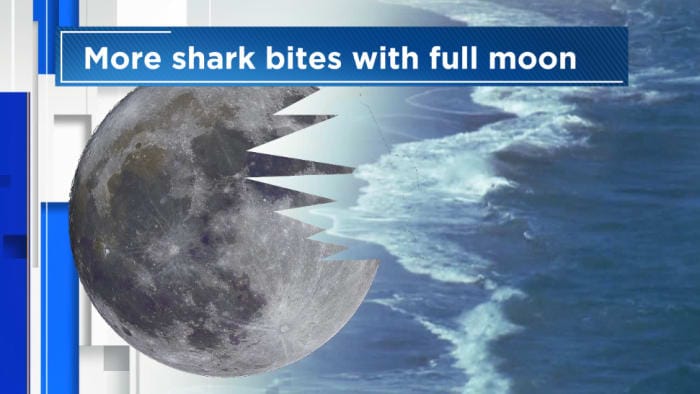Thinking of swimming under a full moon? You may be more at risk for a shark bite based on the moon phase, according to research at the University of Florida. Image via news4jax.com
– News from elsewhere covered by Quincy Quarry with commentary added.
Shark bites increase during Full Moons.
Just what one does not want to hear as daydreaming about taking a vacay to somewhere warm ramps up as the weather turns cold and snowy in New England.
In any event, University of Florida researchers have found that shark attacks peak during times when the moon is full as well as that attacks conversely fall off when moonlight is sparse.
In turn, media coverage has tended focused on how sharks have an electromagnetic sensing ability and a fuller moon gives rise to an increase in electromagnetism given the increased reflection of the sun’s rays off of the moon during periods of fuller moons, and that such is what is fueling heightened periods of shark attacks.
Quincy Quarry, on the other hand, had its scientific research take a deep dive into the research report and so provide an actually proper review.
Dense narrative, as well as an even denser discussion of the numbers even for scientific journal submission white papers, the Quarry’s research desk was able to make the following incisive bites
One, the research team made much of how it did find various relationships, more research was needed so as to develop a more definitive understanding of the peaks and valleys of sharks eating habits.
In other words, the research team will surely be using the paper to pimp for scoring more research funding.
Plus, the team is all but assuredly also planning to roll out bite-sized slicing and dicings of this study so as to score the maximum number of academic journal publications as publish or perish is the driving force motivating all too often starving academic researchers.
That and how even more starving are the lead researchers’ hungrier as well as woefully under-compensated research assistants who live meager existences at the bottom of the academic food chain.
In any event, the lead researchers did acknowledge that moonlight might enhance the ability of sharks to visually hunt for food. After all, sharks are known to be surface hunters, and thus higher levels of moonlight during full moons surely enhance their ability to visually spot potential victims near the surface.
At the same time, Quincy Quarry’s research desk could not discern if the researchers duly tracked the times of day when sharks struck even if the researchers did undertake the usual collection of all manner of extraneous data points so as to be able to flesh out their paper with all manner of discussions of chi-squared’s and other sorts of ultimately but statistical correlations which most every knowledgeable researcher knows are but correlates as opposed to providing definitive causality.
Then again, slogging through such calculations is a great antidote to insomnia.
Source: Shark bites increase with brighter moon

















QuincyQuarry.com
Quincy News, news about Quincy, MA - Breaking News - Opinion
No more posts